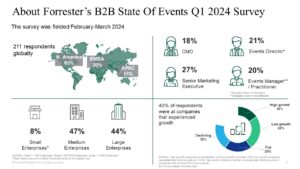The Global State Of B2B Events — Eight Key Findings On Event Trends From Forrester’s Recent Survey
Over the past four years, marketers have navigated unprecedented change in the B2B event sector as first the pandemic and then inflation impacted their plans. To help leaders better understand this dynamic landscape, Forrester’s Q1 2024 State Of B2B Events Survey gathered responses from over 200 event decision-makers to identify and analyze the key trends.

Here are eight of the high-level trends from the survey to which leaders must pay attention:
- A majority of marketers are struggling with declining or flat event budgets. Although inflation has fallen from 2022–23 highs, the reality is, unless you’ve received an increase of 8–10% for the last two years, in real terms, your event budget is down. Yet stakeholders expect teams to deliver the same numbers and quality of events. This required marketers to reevaluate their event mix, priorities, and team structures in the search for cost and efficiency gains.
- The B2B event mix encompasses in-person, virtual, and hybrid formats. Within these high-level formats, however, the survey identified key changes. Fifty-eight percent of marketers are planning to hold more small, hosted/owned in-person events, making this the fastest-growing event type. The second-fastest-growing event type is webinars, with these a particular focus for both midsized and North American organizations. Marketers must consider the full range of options and design integrated audience-centric event plans.
- Marketers are focused on extending event impact. To improve event ROI, 92% of respondents plan to improve their post-event attendee follow-up this year, and 77% are taking this further and looking to build year-round attendee engagement. Leaders we spoke with are now building integrated 12-month event plans. These incorporate a range of event formats and use data and repurposed event content to drive “in-between” event engagement.
- Data and measurement is the number one priority. Budgetary pressures have brought a renewed focus on performance and better ROI measurement (a priority for 95% of respondents). To be successful here, marketers must take a different approach to event technology selection, deployment, and integration.
- ESG is not a priority. Teams appear to have deprioritized environmental, social, and governance (ESG)-related initiatives, although there are clear regional differences, with sustainability a strong focus for EMEA teams (79% identified it as a priority) compared to North American ones (32%). Somewhat surprisingly, given the potential brand impact, the data also showed that CMOs are significantly less interested in ESG-related event areas than event leaders.
- Event technology usage and spend has proliferated. Around a quarter of large enterprises use six or more B2B event technology solutions, spending over $250,000 per annum in the process. Surprisingly, given the budgetary pressures that organizations are under, the majority plan to maintain current spend levels. Leaders should investigate consolidation opportunities as a priority.
- Event technology integration remains a challenge. Only one in five enterprises has integrated its primary B2B event technology platform with its wider marketing technology stack. Too many teams treat event tech as a tactical asset, rather than a strategic one. They frequently lack the experience and/or skills to drive integration projects and are too focused on “at-event” execution to maximize the value of the data being captured.
- Centralization is seen as a potential panacea. To drive efficiencies and scale event activity more effectively, leaders are centralizing event planning, execution, and technology management and exploring the benefits of event centers of excellence.
Forrester clients can read the new B2B event trends report or request a guidance session to better understand what the findings mean for their teams and organization.
